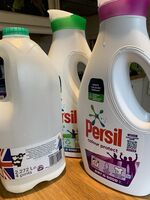HDPE (2): Difference between revisions
addition of further images |
mNo edit summary |
||
| Line 13: | Line 13: | ||
<br clear="none" /> | <br clear="none" /> | ||
<gallery widths=300px heights=200px perrow= | <gallery widths=300px heights=200px perrow=5 caption="HDPE Examples"> | ||
File:HDPE bottles.jpg|250px|HDPE bottles | File:HDPE bottles.jpg|250px|HDPE bottles | ||
File:Freshly Extruded 800mm HDPE Pipe at Acu-Tech Piping Systems.png|Freshly Extruded 800mm HDPE Pipe | File:Freshly Extruded 800mm HDPE Pipe at Acu-Tech Piping Systems.png|Freshly Extruded 800mm HDPE Pipe | ||
Revision as of 14:23, 25 October 2021

HDPE (High Density Polyethylene) is a type of plastic often used in bottles and is captured as HDPE (2) in WikiWaste
HDPE (2) is a thermoplastic polymer made from petroleum. It is one of the most versatile plastic polymers and thus used in a wide variety of applications such as plastic bottles (milk, bleach, Liquid washing containers), cutting boards, piping, cable insulation, toys, picnic ware, household and kitchen ware and carrier bags[1]. It is known for its outstanding tensile strength and large strength-to-density ratio,; HDPE (2) plastic has a high impact resistance and melting point[1], [2].
It can also be found in some rather unusual places[1]:
- wood plastic composites
- Snowboards
- plastic surgery, specifically skeletal and facial reconstruction
- HDPE Examples
-
HDPE bottles
-
Freshly Extruded 800mm HDPE Pipe
-
Milk crate
-
HDPE Construction safety net
Properties
- Stiffness, strength, toughness, barrier to gas and moisture
Common Applications
- Water pipes, gas pipelines, electrical and communications conduits, buckets, milk and juice bottles, grocery bags, some toiletry bottles




